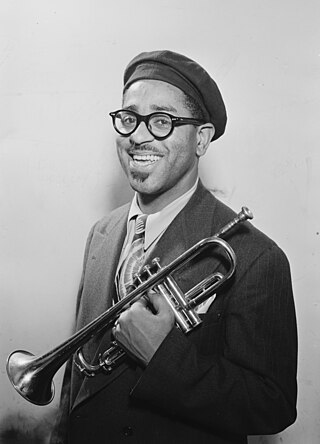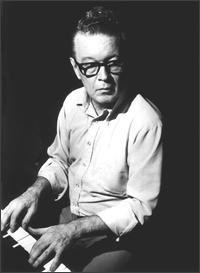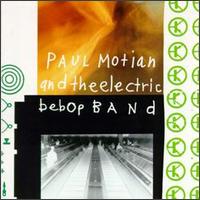Related Research Articles

Bebop or bop is a style of jazz developed in the early to mid-1940s in the United States. The style features compositions characterized by a fast tempo, complex chord progressions with rapid chord changes and numerous changes of key, instrumental virtuosity, and improvisation based on a combination of harmonic structure, the use of scales and occasional references to the melody.

John Birks "Dizzy" Gillespie was an American jazz trumpeter, bandleader, composer, educator and singer. He was a trumpet virtuoso and improviser, building on the virtuosic style of Roy Eldridge but adding layers of harmonic and rhythmic complexity previously unheard in jazz. His combination of musicianship, showmanship, and wit made him a leading popularizer of the new music called bebop. His beret and horn-rimmed spectacles, scat singing, bent horn, pouched cheeks, and light-hearted personality have made him an enduring icon.

Alan Warren Haig was an American jazz pianist, best known as one of the pioneers of bebop.

Minton's Playhouse is a jazz club and bar located on the first floor of the Cecil Hotel at 210 West 118th Street in Harlem, Manhattan, New York City. It is a registered trademark of Housing and Services, Inc. a New York City nonprofit provider of supportive housing. The door to the actual club itself is at 206 West 118th Street where there is a small plaque. Minton's was founded by tenor saxophonist Henry Minton in 1938. Minton's is known for its role in the development of modern jazz, also known as bebop, where in its jam sessions in the early 1940s, Thelonious Monk, Bud Powell, Kenny Clarke, Charlie Christian, Charlie Parker and Dizzy Gillespie pioneered the new music. Minton's thrived for three decades until its decline near the end of the 1960s, and its eventual closure in 1974. After being closed for more than 30 years, the newly remodeled club reopened on May 19, 2006, under the name Uptown Lounge at Minton's Playhouse. However, the reopened club was closed again in 2010.

For Musicians Only is a 1958 jazz album by Dizzy Gillespie, Stan Getz and Sonny Stitt incorporating bebop influences.

Adolph Stanley Levey known professionally as Stan Levey was an American jazz drummer. He was known for working with Charlie Parker and Dizzy Gillespie in the early development of bebop during the 1940s, and in the next decade had a stint with bandleader Stan Kenton. Levey retired from music in the 1970s to work as a photographer.
"A Night in Tunisia" is a musical composition written by American trumpeter Dizzy Gillespie around 1940–1942. He wrote it while he was playing with the Benny Carter band. It has become a jazz standard. It is also known as "Interlude", and with lyrics by Raymond Leveen was recorded by Sarah Vaughan in 1944.
Confirmation is a bebop standard composed by saxophonist Charlie Parker in 1945. It is known as a challenging number due to its long, complex head and rapid chord changes, which feature an extended cycle of fifths. Jazz educator Dariusz Terefenko has pointed out the speed and intricacy of "Confirmation's" "harmonic rhythm", which he notes is typical of the bebop era.

James Moody was an American jazz saxophone and flute player and very occasional vocalist, playing predominantly in the bebop and hard bop styles. The annual James Moody Jazz Festival is held in Newark, New Jersey.
"Salt Peanuts" is a bebop tune composed by Dizzy Gillespie in 1941, co-written by drummer Kenny Clarke. The song was copyrighted on October 13, 1941 and credited to both musicians. It has also been erroneously cited as Charlie Parker's. Parker himself publicly credited Gillespie as the composer on May 15, 1953, as may be heard on the Jazz at Massey Hall live recording. The original lyrics have no exophoric meaning. Instead, they are a skat/bebop vocal which matches the octave note interval played predominantly throughout the song. The Pointer Sisters subsequently included vocalese lyrics for their rendition of Salt Peanuts as recorded on their That's a Plenty album.

George Walker "Big Nick" Nicholas was an American jazz saxophonist and singer. Strongly influenced by his hero, Coleman Hawkins, Nicholas in turn influenced a young John Coltrane to compose his tribute "Big Nick", included on the 1962 album Duke Ellington & John Coltrane.
"Ko-Ko" is a 1945 bebop recording composed by Charlie Parker. The original recorded version lists Parker on alto saxophone with trumpeter Miles Davis, double bassist Curley Russell and drummer Max Roach. Due to the absence of Bud Powell, Dizzy Gillespie was enlisted to play piano, instead of his usual trumpet. Pianist Sadik Hakim, then known as Argonne Thornton, was also known to be present at the session. Rumors persist to this day about precisely who played trumpet and piano on this piece; some claim it's young Miles Davis who plays trumpet and Gillespie comping at piano, on both takes; most claim Gillespie plays trumpet and, or instead of, piano; some claim Hakim is the pianist on all or part of one or both of the takes. However, Miles Davis confirms in his autobiography that he did not play trumpet on "Ko Ko":
"I remember Bird wanting me to play "Ko-Ko," a tune that was based on the changes of "Cherokee." Now Bird knew I was having trouble playing "Cherokee" back then. So when he said that that was the tune he wanted me to play, I just said no, I wasn't going to do it. That's why Dizzy's playing trumpet on "Ko-Ko," "Warmin' up a Riff," and "Meandering" on Charlie Parker’s Reboppers, because I wasn't going to get out there and embarrass myself. I didn't really think I was ready to play tunes at the tempo of "Cherokee" and I didn't make no bones about it."
Nelson Boyd was an American bebop jazz bassist.
"Little" Benny Harris was an American bebop trumpeter and composer.
Walter Gilbert "Gil" Fuller was an American jazz arranger. He is no relation to the jazz trumpeter and vocalist Walter "Rosetta" Fuller.
"Groovin' High" is an influential 1945 song by jazz composer and trumpeter Dizzy Gillespie. The song was a bebop mainstay that became a jazz standard, one of Gillespie's best known hits, and according to Bebop: The Music and Its Players author Thomas Owens, "the first famous bebop recording". The song is a complex musical arrangement based on the chord structure of the 1920 standard originally recorded by Paul Whiteman, "Whispering", with lyrics by John Schonberger and Richard Coburn (né Frank Reginald DeLong; 1886–1952) and music by Vincent Rose. The biography Dizzy characterizes the song as "a pleasant medium-tempo tune" that "demonstrates...[Gillespie's] skill in fashioning interesting textures using only six instruments".

Groovin' High is a 1955 compilation album of studio sessions by jazz composer and trumpeter Dizzy Gillespie. The Rough Guide to Jazz describes the album as "some of the key bebop small-group and big band recordings."

"Manteca" is one of the earliest foundational tunes of Afro-Cuban jazz. Co-written by Dizzy Gillespie, Chano Pozo and Gil Fuller in 1947, it is among the most famous of Gillespie's recordings and is "one of the most important records ever made in the United States", according to Gary Giddins of The Village Voice. "Manteca" is the first tune rhythmically based on the clave to become a jazz standard.

Paul Motian and the Electric Bebop Band is an album of bebop jazz standards by American drummer Paul Motian originally released on the German JMT label. It was the first release by the Electric Bebop Band, which featured the veteran drummer working mainly with younger musicians and which subsequently became one of Motian's primary groups until the end of his life.

To Bird with Love is a live album by trumpeter Dizzy Gillespie with an array of guest stars. It was recorded at the Blue Note Jazz Club in New York City on January 23–25, 1992 and released on the Telarc label. Gillespie's performances at the club in January and February of that year yielded two additional live albums, Bird Songs: The Final Recordings and To Diz with Love. Together, these three titles represent his final recordings prior to his death in 1993.
References
- ↑ Yanow, Scott (2000). Bebop. Miller Freeman Books. p. 242. ISBN 0-87930-608-4.